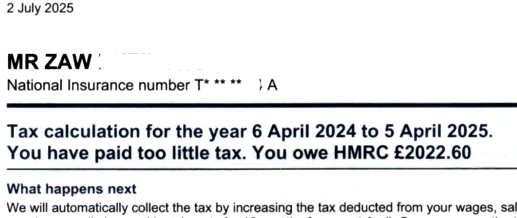You Have Paid Too Little Tax
A surprise wake-up call from HMRC. This post will prompt you to meticulously review your earnings and tax obligations.
PERSONAL
Dr Zaw
7/21/20253 min read


Navigating UK Tax as a Doctor
Last week, a seemingly innocuous brown envelope landed on my doormat. The kind that usually holds junk mail or a utility bill. But this one, from HMRC, hit differently. The subject line: "Tax calculation for the year 6 April 2024 to 5 April 2025. You have paid too little tax. You owe HMRC £2022.60."
My heart did a little plummet. TOO LITTLE TAX! £2022.60!
For a fleeting moment, I desperately wished it was a sophisticated scam. But no, the P800 form, a standard tax calculation, confirmed the grim reality. I owed money. A significant chunk of it.
Once the initial shock subsided, I did what many of us do when faced with a common predicament: I turned to social media. And oh, the relief that washed over me! Scrolling through our Facebook group, "International Medical Graduates (IMGs) in the UK", I quickly realized I wasn't alone. Far from it. Fellow doctors, many in similar positions, were sharing their own tales of unexpected tax bills, some even running into the thousands. There's a strange comfort in shared misery, isn't there? It quickly became clear that my tax shortfall likely stemmed from undeclared earnings from locum shifts.
My main employer, NES Healthcare, diligently deducted tax from my regular salary. However, my locum shifts, picked up through ED Staffing with individual "Zero-hour contracts" for each assignment, seemed to have slipped through the tax net.
A Quick Tax Refresher for UK Doctors (and a heads-up for my past self!):
In England, our tax-free personal allowance currently stands at £12,570 (tax code 1257L). Anything earned above that is taxable. The income tax rates are:
Basic Rate: 20% on earnings from £1 to £37,700
Higher Rate: 40% on earnings from £37,701 to £125,140
Additional Rate: 45% on earnings over £125,140
(A note for our Scottish colleagues: remember your income tax and dividend rates differ from England's!)
The Silver Lining (If There Is One!):
Thankfully, this isn't a "pay it all at once or face a penalty" situation like a DVLA fine. HMRC's P800 notification thankfully stated they'll automatically adjust my tax code, collecting the owed amount in equal monthly instalments from my salary starting next April, over 12 months. There's also the option to pay immediately, but let's be honest, 99.99% of us will likely opt for the deferred payment plan.
My Dos and Don'ts for Fellow Doctors (Learned the Hard Way!):
DOs:
Educate Yourself: This is paramount. Don't assume your employer or agency is handling everything, especially if you have multiple income streams like locum work. Understand your tax code and how it applies to all your earnings.
Keep Meticulous Records: Document every single penny earned from all sources, including locum shifts. Keep track of all expenses.
Know Your Tax-Deductible Expenses: This is where you can reclaim some of your hard-earned cash! As a doctor in the UK, you can typically claim tax relief on professional expenses such as:
GMC fees
Royal College memberships and exam fees
Medical indemnity insurance (e.g., MDU, MPS)
Professional journals and books directly related to your work
Annual retention fees
Training course fees (if directly relevant to your current role and not leading to a new qualification)
Professional subscriptions (e.g., BMA)
Specialist equipment required for your job (if you pay for it yourself)
Travel expenses for work (excluding your regular commute, but including travel to different workplaces if part of your contract, or to attend courses/conferences)
Home office expenses (if you regularly work from home and incur additional costs)
Consider a Self-Assessment: If you do a significant amount of locum work or have other complex income, it's often advisable (and sometimes mandatory) to register for Self-Assessment with HMRC. This allows you to accurately declare all income and claim all eligible expenses.
Seek Professional Advice: If in doubt, consult with an accountant who specializes in medical professionals. It's an investment that can save you significant stress and money in the long run.
DON'Ts:
Assume Everything is Covered: Don't just assume all your income sources are taxed at source correctly. Always double-check.
Ignore HMRC Correspondence: No matter how alarming, open and address all communications from HMRC promptly. Ignoring them will only make the situation worse.
Panic! While it's jarring to receive such a bill, there are usually options for payment, as I discovered.
Following channels may be helpful:
This P800 wasn't just a bill; it was a much-needed personal finance wake-up call. It's prompted me to delve deeper into the intricacies of the UK tax system and the laws that govern it. While the initial sting of owing money is real, the relief of understanding the situation and having a plan to address it is immense.
Has anyone else found themselves in a similar situation? Share your experiences, tips, or even just a sympathetic virtual nod in the comments below. Let's navigate these financial waters together!
Blog
From Yangon to UK: Decades of Medicine, Moments of Reflection
LINKS
SUBSCRIBE
© 2025. All rights reserved.
